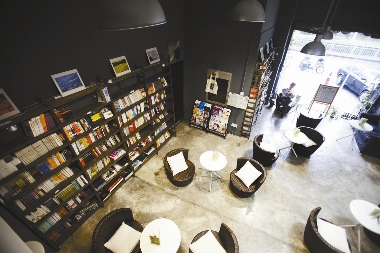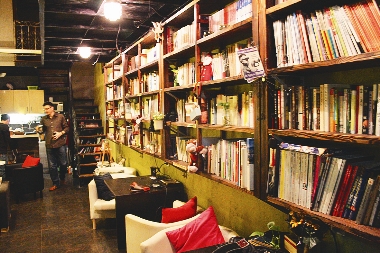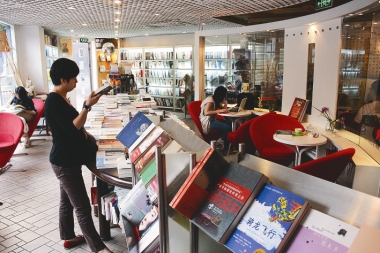


Despite O2Sun’s stroke of good fortune to revive with capital injection, the bookstore industry has been left wondering what is next — and maybe even who is next.
Cao Zhen
AFTER the much-loved independent Jifeng Bookstore closed its fourth Shanghai outlet in July and the renowned Sanlian Bookstore closed its last two outlets in Guangzhou in September, China’s largest privately owned bookstore chain O2Sun closed its seven stores in Beijing on Oct. 28.
Although it was no surprise, the move still cost the publishing industry shelf space that is becoming increasingly scarce as brick-and-mortar bookstores continue to close.
O2Sun was troubled by a shortage of capital, decreasing sales and high running costs, which resulted in huge debts to book dealers. On the night of Oct. 28, dealers repossessed everything left in O2Sun’s Beijing stores, including coffee machines, air-conditioners, refrigerators and even gas tanks.
“The sales of O2Sun have been decreasing for four years. This year they dropped 40 percent,” said Sun Chi, founder and general manager of the Xiamen-based chain. “However, pressure from the rising costs, especially rent, was the biggest headache,” said Sun.
The collapse of O2Sun made plenty of headlines chronicling the woes of the bookstore industry. Book-lovers and O2Sun employees appealed on their microblogs to save O2Sun Bookstore, which was founded in 1995 and has the slogan “Inspire Reading.”
On Nov. 11, O2Sun announced that with help from the Xiamen government, the bookstore chain successfully received capital injection from several enterprises, and may reopen its outlets in Xiamen and then reopen Beijing’s outlets, China Economic Times reported.
Despite O2Sun’s stroke of good fortune, the bookstore industry has been left wondering what is next — and maybe even who is next.
“The demise of brick-and-mortar bookstores is well under way. It may be an irreversible historical trend,” said Xu Zhiqiang, general manager of Trends Lounge bookstore in Beijing. “High rent and the increasing popularity of shopping online are posing challenges to brick-and-mortar bookstores,” said Xu.
“Online retailers don’t have to pay rent and State-owned Xinhua Bookstore chains are backed by government capital, which puts privately owned bookstores in a weaker position,” said Shen Zheyan, an analyst with CIConsulting.
“Meanwhile, private bookstores have to pay a 13 percent value-added tax and 25 percent income tax, while Xinhua is exempt from a series of taxes,” said Shen.
Although some have blamed the disheartening trend on Xinhua Bookstore, Shenzhen Book City, the city’s State-owned bookstore brand under the Xinhua system, did not think Xinhua had an unfair advantage.
A senior manager at Shenzhen Book City, who refused to be named, said more than 50 Xinhua Bookstores in the country were running at a loss but they were not allowed to close because the chain bears the responsibility of developing the country’s cultural life.
The manager did not disclose Shenzhen Book City’s business conditions but confirmed that in the fast-evolving bookselling environment, understanding the e-commerce revolution is key to physical bookstores.
“Many bookstores offer online retailing service, including Shenzhen Book City. The service allows shoppers to order online and collect their books at the store or have it delivered,” said the manager.
Some private bookstore owners, which fight to stay afloat for years amid a tough retail environment, hope the bankruptcies in the past two years would give them a chance to reinvent themselves.
“It is becoming increasingly clear that in light of the environment of curtailed customer spending, physical bookstores should be places of culture, comforting, inclusive and not snobbish,” said Ge Yu, manager of Yi Book Bar in Shekou’s Weiyuan Building.
Some small bookstore owners choose to compete with Xinhua or e-commerce Web sites with intimate author events and a carefully chosen rotation of books.
Old Heaven bookstore in OCT-LOFT, which is outfitted with snacks and beverages to offer a more social atmosphere, never sells best sellers, but some old books and little-known literary books.
The shop sells 100 books a day, according to Tu Fei, one of the owners of the 200-square-meter bookstore.
Shang Book Bar, which rents an outlet in Shenzhen Book City’s CBD store, also sells old books but its manager admitted that their profits mainly come from the wine business.
Yi Book Bar’s Ge said she is counting on her store to drive home a sharp, tough-love message to book lovers: “Running a bookstore or a book bar is a significant thing. If you agree, it is your responsibility to keep it alive.”
|

